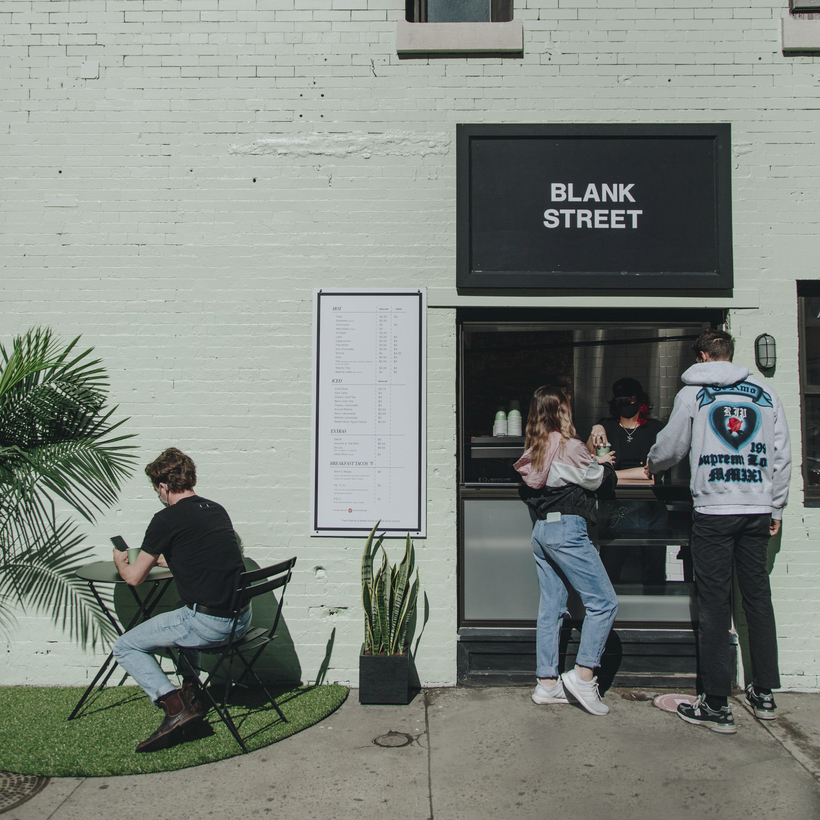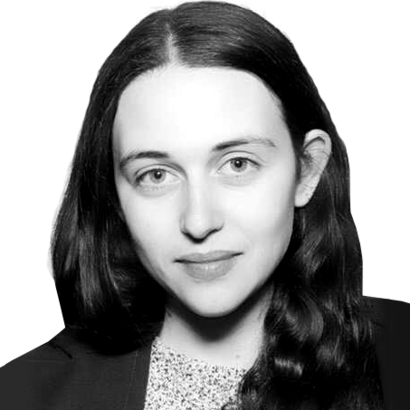When I moved into my Lower East Side apartment, eight months ago, there was only one Blank Street Coffee between me and AIR MAIL’s West Village offices. It wasn’t even a store, but a window. On the other side of a brick wall painted in pistachio green were two baristas wearing black T-shirts and handing over cold brew and croissants. Now if I spit in downtown Manhattan, I’ll hit a Blank Street.
The company started on August 1, 2020, in Williamsburg, as a mobile, battery-powered coffee cart. The second location came six months later, a tiny shop less than half a mile away. By the end of 2021, there were 26 stores, carts, and kiosks—from the Upper East and West Sides down to SoHo and farther into Brooklyn.
In the remainder of 2022, New York City will get roughly one new Blank Street per week, until there’s 100 total. London will get two dozen this year. Residents of Boston, Miami, and Washington, D.C., will have to make do with seven each.

Blank Street, which runs on $30 million from various venture-capital firms, looks like a quaint neighborhood spot. The biggest store can fit a line of just four customers.
The company hired the former communications manager for Soho House to lead its marketing team. On Instagram, it is laid-back and earnest, posting photos of Patti Smith brooding over coffee, Go Fund Me pages to raise money for local coffee shops going bankrupt, and Web 1.0–style images that read: “Our graphic designer doesn’t start until next month but we have to promote our fall menu now.”
Alongside the customers taking to social media to enthusiastically post about the three free drinks Blank Street offers if you download their app or refer a friend, there are many others who seem skeptical of the company.
Tweets range from “Blank Street Coffee is the new VC bro chain right?… Guess I’ll avoid that one,” to “A new coffeeshop chain started popping up across Brooklyn overnight and I thought ‘gotta be finance guys gambling with other people’s money’ and what do you know.”
Millennials and Gen Zers, it turns out, can smell V.C. funding through their screens.
Origin Story
Vinay Menda, 29, and Issam Freiha, 26, attended the same high school—the American School of Dubai—but didn’t meet until they both moved to Manhattan for college. (Menda went to N.Y.U.; Freiha, to Columbia.)
They bonded over a shared interest in start-ups, and in 2015, they founded the venture-capital fund Reshape, raising money from friends and family. Menda was just about to graduate, while Freiha was still a sophomore at the time.

The pair started putting money in food-tech companies, such as food-delivery services and ghost kitchens, and soon realized they could start their own, one that relied on technology to make service cheaper and faster.
“When we thought of this model, it made sense that coffee was the way to start because it’s such an important local good,” Menda tells me over Zoom, from a WeWork in NoMad, Blank Street’s temporary headquarters until they move into their Williamsburg office.
During lockdown, in the spring of 2020, Menda and Freiha launched Blank Street, which they hoped would capture the rhythm of Starbucks, the price point of Dunkin’, and the quality of Blue Bottle. “We want to be the go-to brand for grab-and-go,” Menda says.
Blank Street baristas are “more about hospitality and customer service” than about making coffee, Jai Lott, the V.P. of product and customer experience, tells me outside the Lafayette Avenue location as he sips a “Sparky,” an espresso with tonic water and lemon juice.
Coffee-making is handed over almost entirely to the Cameo, an automated machine designed by Matt Perger, “the Elon Musk of coffee.” It “remove[s] all the variables” and does “everything that you need,” Lott says.
According to Lott, most customers don’t even notice that their cortados are machine-made. “Maybe one in 500 people would be like, ‘Oh, it’s an automatic machine. They’re not even making good lattes,’” says Lott. “It’s all just perception.”

“We’ve just hired an in-house tech,” Lott says. “He can see the back end of every single shot of espresso and the temperature that’s happening in all the stores at all times.” Lott hopes the Blank Street tech engineers can enable Slack to notify him whenever a barista overheats milk.
It takes the “craft away from specialty coffee,” he says, “because it’s redundant.”
Vibes, Values, and Venture Capital
Reshape was one of the company’s seed-round investors, as was Justin Mateen, the founder of Tinder. Several months after that $7 million round, the company raised $25 million in Series A funding. Their new investors included Neil Blumenthal, Dave Gilboa, and Jeff Raider—the founders of Warby Parker—and Joey Zwillinger, the founder of Allbirds.
In the last decade, big investors have made big money buying up specialty coffee shops and turning them into businesses. In 2011, a private-equity firm invested in Stumptown Coffee Roasters, then a beloved independent roaster in Portland, Oregon, and expanded the store from a mom-and-pop shop into a nationwide purveyor of bottled cold brew. Four years later, Peet’s Coffee & Tea, which is owned by a German investment firm, bought Stumptown.
Blue Bottle Coffee, which started as a specialty coffee kiosk in San Francisco in 2002, also expanded with the help of investors, including Morgan Stanley and Bono from U2. Nestle bought a majority stake in 2017.
La Colombe, Intelligentsia, and Philz Coffee have followed the path of their forebears.
Blank Street is cutting out the humble-origin story and going straight to investor-backed expansion. It’s a business focused on making money by selling specialty coffee, not a specialty coffee shop that sells drinks that make money. But their V.C.-funded pistachio-milk lattes are trying to tap into two generations that “have turned their back on capitalism,” as The Guardian recently put it.

In one TikTok from December, a woman explained that Blank Street’s then new Flatiron location was giving away free coffee if you whispered “Flatiorn [sic]” to the barista. Someone responded, “Aren’t they backed by venture capitalists, determined to ice out all local mom and pop coffee shops?”
On a TikTok montage of “You NEED to try these NYC coffee shops,” which featured Blank Street, someone commented, “As a head up, blank street is backed by venture capitalist [sic].” The person who posted the video responded “What a bummer :/.”
The next-gen’s Starbucks, like their celebrities, must champion a good cause, and padding venture capitalists’ wallets is decidedly not one of them.
It takes the “craft away from specialty coffee,” says Blank Street’s V.P. of product and customer experience.
Online, many speculate that Blank Street is pricing out independent coffee shops, despite its Web site’s insistence the company is “investing in the right things” such as “local vendors and better value for our neighbors.”
Blank Street uses Parlor coffee, a Brooklyn-based roaster, and sells cookies and banana bread from local bakeries. “We make sure that the products we sell are not from one bakery in the back of the basement at Starbucks,” Menda explains. And Blank Street is good for neighborhoods, he says, because they pay their baristas better than most coffee shops do: a guaranteed $23 an hour.
Initially, the intention was to “open in neighborhoods that had not as many other options,” Menda says. “That’s why we picked Williamsburg.”
“We’re taking customers from [Starbucks] and [Dunkin’],” he says. “Ideally, not from local shops.”

The company estimates it can open one shop for every 20,000 people, which means multiple shops in a single neighborhood. This also means new Blank Streets often pop up next to independent coffee shops. Naming every local or independent coffee shop that is now neighbors with a Blank Street would turn this story into the Yellow Pages.
Take their West Village locations as an example. The Seventh Avenue shop is across the street from Birch Coffee, around the corner from Caffè Aronne, and two blocks from Yanni’s Coffee. Their Bleecker Street store has a lovely view of Hungry Ghost’s door, and is a block west of Patisserie Claude. And their soon-to-open Eighth Avenue location is taking the place of Rebel Coffee, an independent, unassuming coffee shop that served excellent espresso shots for seven years.
“‘Community’ is starting to rival … ‘Brooklyn’ as the most abused word in the last five years,” Ninth Street Espresso owner Ken Nye tells me. Nye opened his Tompkins Square Park shop in 2001; on November 19, Blank Street opened a store a block away. “Saying, ‘We’re gonna open 1,000 stores, but we’re all about community,’ it’s a contradiction,” Nye says. “It’s not possible.”
“How can a smaller shop compete with that level of funding?” says another employee from a New York City coffee shop that’s been around since the 80s. During the lockdown her shop had to close one of its locations. Now it’s a Blank Street.
When asked about the accusations that Blank Street is pricing out independent coffee shops, Lott says, “There will be times where we will open a coffee shop next to someone who’s been there for 25 years .... [That’s] just the way it works.”
“We have good intentions,” Menda adds.
Jensen Davis is an Associate Editor for AIR MAIL


